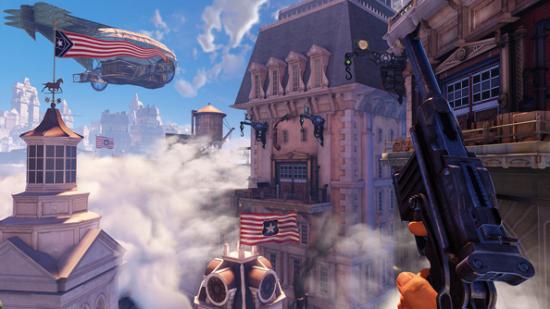There’s a bit near the very start of BioShock Infinite where a travelling barbershop quartet rock up to a sunny promenade and serenade a young couple with a few verses from God Only Knows, torturing pleasant, extended harmonies out of every word before floating away on their own personal sky-barge to some other part of this giant, opulent city in the clouds. You can stand there and watch the scene for a few minutes in stunned disbelief: God Only Knows wasn’t released until 1966.
But that’s probably the point. The 1912 setting of BioShock Infinite is shot through with deliberate anachronisms, some subtle like a Beach Boys cameo, and some that will make no qualms about time-slapping your dumb jaw to the floor. There’s a dreamy weirdness that permeates the city of Columbia that isn’t explained in the few hours of playtime we had with BioShock Infinite. It riffs on chance, choice, fate, determinism and quantum physics. Coin tosses give improbable results, raffle tickets are called before they’re drawn with Derren Brown levels of impunity. Something’s very slightly wrong with how reality works in this universe, but nobody seems to notice.
It makes sense, however, that protagonist Booker Dewitt is happy to ignore this crease in reality and just carry on with things: his objective is uncomplicated and singular: he is to infiltrate Columbia, retrieve Elizabeth and hand her over to some debtors who shout at him in his flashbacks.
He’ll do this by recreating BioShock’s introduction in reverse: Infinite begins with Booker at sea, removing a gun and his instructions from a metal lunchbox before entering a storm-battered lighthouse. Here he collects his ticket to Columbia, activating a rocket-powered launch-pod that propels him above the cloud layer and reveals for the first time the scale and majesty of the impossible city. Columbia is a chunk of turn-of-the-century America, a statue-infested, puritanical town around which airships buzz, clouds creep and flags flutter. It’s ruled by the unhinged, hyper-religious and self-appointed prophet Comstock, who promises salvation to Columbia’s citizens by shouting at them through loudspeakers every day.
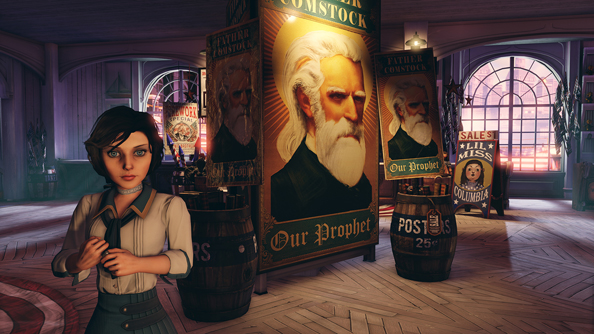
It seems to work, Columbia has as much of a dark cultist mindset as Rapture ever had, and you’re seen as just as much a disruptive and unwelcome agent, a unruly first-person cat bouncing around next to a meticulously constructed house of cards. It’s Comstock who, having somehow been tipped off as to your identity, orders your immediate death without trial. Meanwhile a rebel group, the Vox Populi, forms the opposing slice of bread in the politicalsandwich Booker is desperately trying to avoid putting in his mouthduring hismission to liberate Elizabeth.
Though caught in the middle of this conflict, Columbia is a resolutely civilised place to explore. More so than in BioShock, more so than in games likes Deus Ex and Dishonored, levels are filled with regularpeople going about their business, having conversations within earshot, being animated and human as best they can. Columbia isn’t abandoned or ruined, it’s thrivingand you enter it during its heyday, where markets and fairs fill the boardwalks, promenadesand gardenswith well-attired and excited gentlemen and ladies.
It’s a colourful, vibrant and interactive place: you can take part in games at the carnival, which are beautifully disguised tutorials for the game’s shooting and magic-casting abilities. You can peer into what you’d expectto be a coin-operated peep show, but turn out to be mini-documentaries showing the foundation of the city. You can wander and absorb as much as the fiction as you care to, like a narrative ghost wandering astorybook graveyard. And you can listen to The Beach Boys. BioShock Infinite isproper virtual escapism, like the kind you hear about in the first line of news reports, when they try to snappily explain what videogames are.
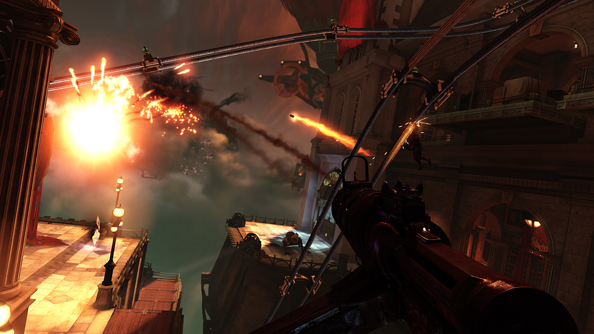
I didn’t like the shooting in BioShock, there was a pane of cognitive mind-glass somewhere between my mouse hand and the game’s lazily clunking controls that made me feel removed from an otherwise welcoming world. It probably had something to do with mouse acceleration, it nearlyalways does, but BioShock Infinite doesn’t suffer from this sluggishness. It’s fast and snappy, your weapons crack loudly and headshots are fatal, movement is swift and sharp, enemy AI is clever enough to force you to movethrough combat arenas. Those rollercoaster rails that wind and arc between platforms are remarkably easy to use and, thankfully, it’s either impossible or suitably difficult to murder yourself while grinding along them. Similarly, Irrational haverecognised precisely how irritating it would be if falling into the clouds resulted in anything other resetting you at the position where you fell off. So don’t worry about that either.
Your Vigor powers are partly carried over from the previous BioShock. You can summon flocks of crows to pester enemies, which is a lot like that time you summoned swarms of bees to pester enemies. The new Bucking Bronco Vigor jolts enemies skywards, another launches firebombs from your fist, while a more tactical minded Vigor can possess mechanical turrets, temporarily turning them friendly. Certain Vigors can also be placed as traps that activate as enemies walk over them, increasing your options and allowing you to play defensively when the odds are stacked against you.
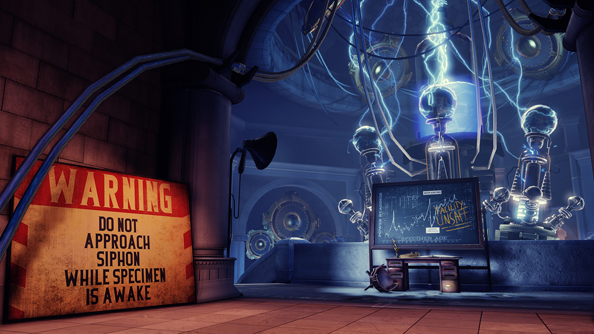
Elizabeth follows you around too. On your instruction,she’s able to open up ‘tears’ in space and ‘pull through’ objects from paralleldimensions. In practical terms that meansshe can make usefulthings appear at certain pre-defined positions in the game: she could conjure up a turret placement, or an ammo cache, or a sky-hook that you could latch on to in orderto access a higher platform. She can only open up one of these tears at a time however, so choosing which ones to utilise can transform the course of a firefight.
Shawn Elliott told us about how these encounters play out later in the game, as the arenas become multi-tiered battlefields pockedwith strategic strong points and populated by warring factions. Though it’s Elizabeth who’s opening and closing these tears, she’s never unavailable in a gameplay sense: that is to say, if you give the order for a trans-dimensional turret to be pulled through a tear, it will happen instantly, no matter her position on the map, as if you’d justdone it yourself. Your ally in Infinite is entirely helpful, not even an occasionalliability. She even throws you ammo and health when you need it most.
You can now also find apparel to wear in a limited number of slots, with each item of clothing offering a new ability. There’s a hat that makes you more accurate when shooting from skylines. There are some trousers that let you, erm, hurt people more. The early items were tame enough, but rare. I expect increasingly powerful trousers will be found later in the game.
This sine wave of violent, explosivepeaks and peaceful, exploratory troughs are mutually complementary. After rescuing Elizabeth from her tower, you’re hounded by the terrifying, mechanical songbird, a twenty-foot tall clockwork avian horror bound in leather skin and powered by arcane motors set behind glowing, staringeyes. It shrieks and trashes as it tries and fails to keep Elizabeth inside the tower: a pitiful monster, a dumb, misunderstoodmetal giant doing what it must to protect something it cares about. In its tick-tock brain, you’re the bad guy. You’re theworst guy.
The songbird isInfinite’s Big Daddy, minus humanity, plus canary. In a frantichuff itdestroys Elizabeth’s tower (a monolithic, hollowed-out angel that dominates Columbia’s skyline) as you escape, sending you bothplunging into the water below. You wash up on an artificial beach, still aboard the floating city (which you onlynow realise boasts its own miniature seafront, a sandy shore whose fake ocean tumbles over a precipice and falls away into the vast blue sky beneath).
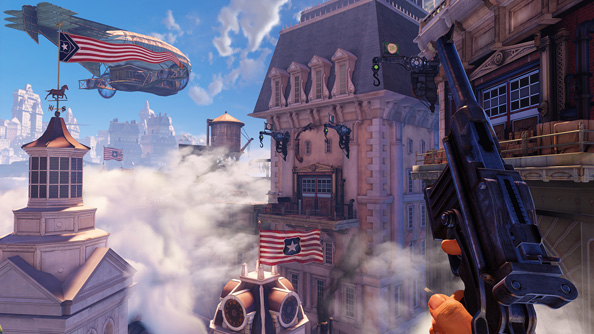
The pace of the game slows here. Elizabeth is missing, but not for long. Infinite bucks the “oh no I lost the person I’m looking for when I fell into the ocean” trope, and she can be found dancing on the nearbypier with fellow beach revellers.Her first experience of music outside of her prison perfectly frames both her childish naivety and Booker’s grimly sober-faced approach to his task. That is to say, Booker don’t dance. He does, if you want, explore the beach and poke around some bins while the heat’s died down. Elizabeth excitedly scoots about, fascinated by the world around her and pelting the oddly stoicBooker with questions.
The locations you then travel to in pursuit of a means to escape Columbia are hugelyvaried: the city has room enough for sun-bleached gardens,churches with vast interiors, dark museums andforebodingcatacombs. Some of the set-pieces feel recycled however: there’s a sense of deja vu as you wander through a historical battle re-enactment while a disembodied voice monologues over loudspeaker.And whether deliberate or not, that Booker’s backstory is a mystery to the player leads you to question his motives at certain points,creating a sort of cognitive dissonance between your actions as a player and his dialogue as a character. Again, like with the time-weirdness, and knowing how Irrational works,that’s probably partially the point.
Also, while I’m thinking about it, looting cash registers and bins and listening to audio diaries isn’t fun, it’s weird and creepy andantiquated.Nobody hasever kept an audio diary at any point in history, they are the least believable part of your magicalflying, crow-obsessedcity.
Everything else is fantastic. Without wanting to slip into meaningless hyperbole,BioShock Infinite could easily be the bestgame Irrational’s ever created: an intelligent collaboration of weird Jules Verne futurism, steampunk science-fiction, time-travelling soundtracks,magic hands and clockwork birds. It’s a truly fascinating and original setting around which Irrational has built a vastly improved set of shooter mechanics and an ideal vehicle for a clever and intriguing story.
Also I like The Beach Boys.
BioShock is out March 26. You can read our interview with Shawn Elliott here.
